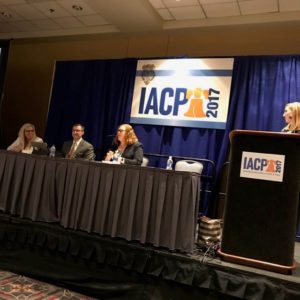By Quincy S. Abbot, Friend and Past National President of The Arc
Bob was one of the humblest of men and also one of the most outspoken of men when urging that individuals with intellectual disabilities have the right to live as other humans live. Bob approached each person as a friend. Each person had self-worth. To Bob, all lives mattered. Specifically, all lives of those with intellectual disabilities mattered.
Bob lived the life that he spoke and wrote about. He ignored any category describing the person. He became a friend with the person. He believed that “the real sin is separation” from other people.
Bob was assigned in the 1960s as Chaplain to the Kansas Neurological Institute (KNI). As such, he became friends with each of the residents and began to wonder why they lived there. The National Association for Retarded Children [1] presented Bob with the Rosemary Dybwad [2] International Award so he could visit Scandinavia “to study the ways in which Swedish and Danish people have given human dignity to their mentally retarded citizens.”
On his return, Bob published an article titled The Dignity of Risk. He laid out a new approach to individuals with intellectual disabilities. “You are a human being and so you have the right to live as other humans live, even to the point where we will not take all the dangers of human life from you.“ He told me a few years ago “that what I wrote was far from popular at KNI in those earlier days.” There remain pockets of disbelief today centered around the remaining institutions.
The Dignity of Risk. What a concept! This was published, and I first read it, in 1972, about the time that I became active in The Arc. It had a profound effect on my attitudes and my daughter’s life. When she wanted to abandon the yellow school bus and walk to school like her sisters, the school opposed undertaking that risk. I insisted that she walk with the words The Dignity of Risk ringing in my head. When she wanted to take the regular bus to and from work, The Dignity of Risk bell rang again. When she wanted to leave the group home for an apartment with another young woman, The Dignity of Risk bell rang once more.
The Arc was an important part of Bob’s life and Bob was an important part of The Arc at local, state and national levels. Each has been enriched by the other. It was The Arc that enabled Bob to bring the Scandinavian stories to us and spread the news of this radical new approach throughout the United States.
After returning from his Scandinavian visit, Bob had a chance to put his newfound knowledge to work. He became the Executive Director of the Omaha Association for Retarded Children, a chapter of the National Association. Later on he was President of the Connecticut state chapter for a year. For many years Bob attended the National Conventions of The Arc to sell his books and Martha’s pictures but mostly to talk with his friends and make new friends.
Bob & Issues of Criminal Justice
For many years, Bob devoted his major effort to Criminal Justice. The phone rang one day in 1991. It was Bob saying, “There is this little guy, Richard LaPointe, falsely accused of murder sitting in a courtroom in Hartford with no one sitting on his side of the aisle. The other side is packed with supporters of the prosecution. Come sit with me on his side.” I was only one of many called that day. True to Bob’s approach they became the Friends of Richard La Pointe — not supporters or advocates for, but friends. After more than 20 years in prison, and several appeals, within the past year, Bob finally was able to see Richard outside of a jail setting. What a glorious day.
Through the years Bob gathered friends to sit in the courtrooms of many falsely accused individuals with intellectual disabilities. He did not win all the cases, as far as the court’s decision was concerned, but he did win friends for those falsely accused.
The Arc realized the vital role that Bob played as a friend to the accused but also realized that more was needed, so it sought and received a grant from Bureau of Justice Assistance within the federal Department of Justice in order to found The Arc’s National Center on Criminal Justice and Disability®. This was the first national effort of its kind to bring together both victim issues and suspect/offender issues involving people with intellectual disabilities. Among a number of products and services, it provides training to law enforcement officers and others in the criminal justice system about people with intellectual disabilities. Recently, Leigh Ann Davis, the Director of the National Center, told me that without Bob’s initial vision and on-going support and guidance over the past twenty years, the Center may have never come to fruition. Furthermore, the Center’s information and referral service remains constantly busy. Through this service, NCCJD® is on the front-lines (much as Bob was) talking with involved individuals, their families, and their friends. With Bob no longer available, there is an even greater need for NCCJD to be a resource for these individuals and their families.
One can hardly talk about Bob without mentioning his longtime friend and wife, Martha. Her pictures enhanced his books and bring a constant reminder of Bob’s work and ideals to those of us, like me, who cherish her drawing hanging upon our wall. I am thrilled that Martha and The Arc are working together still to ensure that Bob’s legacy will not be forgotten and his work won’t stop.
The Arc announced at its just completed National Convention & International Forum in Orlando, Florida that it is establishing the Robert Perske Fund for Criminal Justice that will both honor Bob and assure the continuation of his vital work in the area of criminal justice. An anonymous donor has already contributed $10,000 toward the Fund. I urge your small or large contribution to this Fund as a way to honor Bob and to see that his work continues into the future. It has been an honor to be Bob and Martha’s friend, and I hope you will not only remember him, but remember his life’s work. Thank you.
[1] When The Arc began in 1948 it was originally known as the National Center for Retarded Citizens. It is now known as The Arc, and we have worked furiously to remove the use of the work retarded from anything other than purely medical use.
[2] Drs. Rosemary & Gunther Dybwad were founders of both The Arc as well as Inclusion International.


 Prompted by recent news events, women everywhere are speaking up and sharing accounts of sexual violence. Social media feeds have been so inundated with tales of unwanted personal sexual encounters that it has sparked an online media campaign, punctuated by #MeToo. However, women with disabilities may face greater barriers to talking about their own experiences on social media or elsewhere. That’s why, before this hashtag went viral, The Arc’s National Center on Criminal Justice and Disability® (NCCJD®) and The Board Resource Center (BRC) teamed up to highlight the alarming rate of sexual assault among women with intellectual and developmental disabilities (I/DD). Just this fall these two organizations, with the assistance of a one-year grant from
Prompted by recent news events, women everywhere are speaking up and sharing accounts of sexual violence. Social media feeds have been so inundated with tales of unwanted personal sexual encounters that it has sparked an online media campaign, punctuated by #MeToo. However, women with disabilities may face greater barriers to talking about their own experiences on social media or elsewhere. That’s why, before this hashtag went viral, The Arc’s National Center on Criminal Justice and Disability® (NCCJD®) and The Board Resource Center (BRC) teamed up to highlight the alarming rate of sexual assault among women with intellectual and developmental disabilities (I/DD). Just this fall these two organizations, with the assistance of a one-year grant from 







